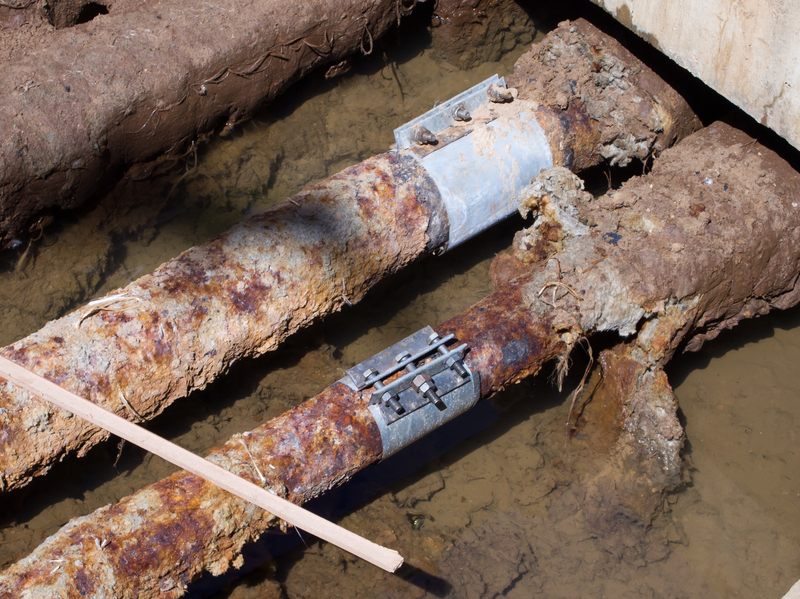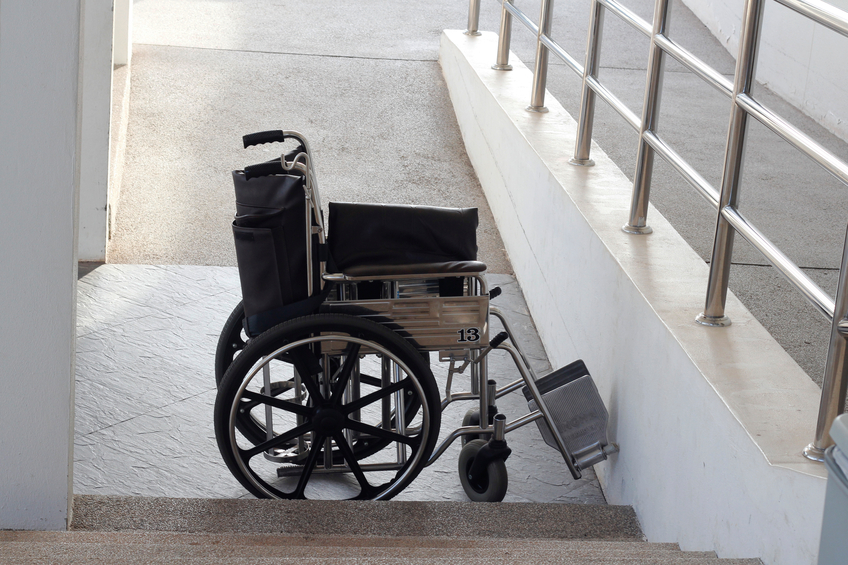Louisiana Materials, ADA and Ethics 15 PDH Discount Package 2
Courses in this Package
Corrosion: Overview (H04-001)
Coating Types and Selection (T06-002)
Americans with Disabilities Act (ADA) Overview (A02-005)
Public Right of Way Accessibility Guidelines (PROWAG) (C02-041)
Ethical Issue: Deciding if Something is a Gift or a Bribe (LE1-007)

This online engineering PDH course provides basic information on the chemical interaction taking place during the corrosion process between the environment and the corroding metal. It also describes preventive measure to minimize or control the corrosion process.
Uncontrolled corrosion can cause many serious problems. Corrosion occurs continuously, and every metal in every facility is subject to some type of corrosion. Even though corrosion cannot be eliminated, it can be controlled.
This 4 PDH online course is applicable to chemical and environmental engineers, design and construction personnel, technical staff and facility operators who are interested in gaining a better understanding of the theory of corrosion.
This PE continuing education course is intended to provide you with the following specific knowledge and skills:
- Corrosion theory
- General corrosion
- Crud and galvanic corrosion
- Specialized corrosion
In this professional engineering CEU course, you need to review Module 2, "Corrosion" of the Department of Energy Publication DOE-HDBK-1015/1-93, "Chemistry".
Upon successful completion of the quiz, print your Certificate of Completion instantly. (Note: if you are paying by check or money order, you will be able to print it after we receive your payment.) For your convenience, we will also email it to you. Please note that you can log in to your account at any time to access and print your Certificate of Completion.

This online engineering PDH course presents each type of coating resin or binder categorized by its film-forming mechanism, different types of pigments, and the various solvent families. It also discusses drying oils which are an integral part of some coating formulations, as well as, driers that aid in the drying reaction. Furthermore, it describes miscellaneous additives that are formulated into many coatings for specific purposes. It also provides guidance on powder coatings, thermal spray organic and inorganic coatings, and galvanizing tapes and wraps.
This course also presents a systematic approach to coating selection for new construction and maintenance painting. It details the criteria for selecting a coating system based on the service environment(s), surface preparation requirements, and options for coating application. Finally, it discusses other considerations such as VOC concerns, coating cost, supplier recommendations, ease of application, and maintainability.
This 6 PDH online course is applicable to engineers, design and construction personnel, and other technical professionals who are interested in gaining a better understanding of coating types, characteristics and selection.
This PE continuing education course is intended to provide you with the following specific knowledge and skills:
- Familiarizing with the various types of film-forming mechanisms
- Understanding how resins (binders) are formed and their underlying pigments
- Learning about drying oil coatings and their corresponding driers
- Understanding the function of solvents in coatings
- Learning about the various additives and their purposes
- Understanding zinc-rich coatings vs. powder and their applications
- Understanding the environmental impacts of volatile organic compounds
- Understanding the process of thermal spray and galvanized coatings
- Learning about how to protect piping and tubular structural shapes with tapes and wraps
- Determining the criteria for selecting a coating system
- Understanding the degree of exposure to atmospheric elements
- Selecting coating systems for ferrous components in fresh water vs. seawater
- Selecting coating systems for black iron and steel pipes
In this professional engineering CEU course, you need to review Chapters 4 and 5 of the "Painting: New Construction and Maintenance" engineering manual, published by the United States Army of Corps of Engineers (USACE), Publication Number EM 1110-2-3400.
Upon successful completion of the quiz, print your Certificate of Completion instantly. (Note: if you are paying by check or money order, you will be able to print it after we receive your payment.) For your convenience, we will also email it to you. Please note that you can log in to your account at any time to access and print your Certificate of Completion.

This online engineering PDH course provides an overview of the Americans with Disabilities Act as it applies to facility design.
For individuals with disabilities, the Americans with Disabilities Act gives civil rights protections similar to those provided to individuals on the basis of race, color, sex, national origin, age, and religion. It guarantees equal opportunity for individuals with disabilities in public accommodations, employment, transportation, state and local government services, and telecommunications.
This 2 PDH online course is intended for all engineers involved in the design of facilities accessible to the public and regulated by the
This PE continuing education course is intended to provide you with the following specific knowledge and skills:
- Familiarizing with the types of facilities covered
- Understanding "public accommodation"
- Learning about the various requirements for accessible facilities
- Understanding when a "direct threat" to health or safety is present
- Understanding "readily achievable" barrier removal for existing facilities
- Familiarizing with the legal enforcement mechanisms available
- Learning about available tax credits and deductions for employers
In this professional engineering CEU course, you need to review the course document titled, "American with Disabilities Act (ADA) Overview" which is based on the original document (http://www.ada.gov/qandaeng.htm) published by the U.S. Equal Employment Opportunity Commission of the Civil Rights Division of the U.S. Department of Justice (DOJ), last updated on
Upon successful completion of the quiz, print your Certificate of Completion instantly. (Note: if you are paying by check or money order, you will be able to print it after we receive your payment.) For your convenience, we will also email it to you. Please note that you can log in to your account at any time to access and print your Certificate of Completion.

This online engineering PDH course presents the main requirements for
This 2 PDH online course is applicable to civil engineers, construction managers, architects and inspectors who are involved with construction in the public right of way.
This PE continuing education course is intended to provide you with the following specific knowledge and skills:
- Familiarizing with the government agencies involved with PROWAG
- Understanding which projects require PROWAG compliance
- Knowing the differences between the current ADA requirements and PROWAG
- Learning about PROWAG sidewalk and slope requirements
- Learning about PROWAG curb ramp requirements
- Learning about PROWAG detectable warning requirements
- Understanding practical examples of reconstructing existing conditions to be PROWAG compliant
In this professional engineering CEU course you will review the main requirements of PROWAG along with practical design examples.
Upon successful completion of the quiz, print your Certificate of Completion instantly. (Note: if you are paying by check or money order, you will be able to print it after we receive your payment.) For your convenience, we will also email it to you. Please note that you can log in to your account at any time to access and print your Certificate of Completion.

This online engineering PDH course will establish, through the presentation of many examples, the principles of distinguishing between a gift and a bribe.
The federal government has formulated detailed rules covering gifts given to executive-branch employees in many situations. The rules are published in the Code of Federal Regulations (CFR) and are illustrated through many examples. Even though the examples are intended for government employees (many of whom are engineers), they also apply to private-sector engineers in similar situations. This course presents selected CFR examples that furnish guidance on the ethics of gift giving in situations that are especially relevant to engineers.
This 1 PDH online course is intended for engineers seeking guidance on distinguishing between ethical gift-giving and bribery.
This PE continuing education course is intended to provide you with the following specific knowledge and skills:
- Familiarizing with definitions of a bribe and a gift
- Knowing the bribe status of a gift based on a personal relationship
- Understanding the conditions under which gifts to spouses are acceptable
- Knowing the need to avoid even the appearance of a gift being a bribe
- Recognizing when gifts involving free attendance at meetings and conferences are acceptable
- Understanding the importance of the cumulative effect of receiving even small gifts on a periodic basis
- Learning the importance of gifts received when on assignment rather than outside of work
Upon successful completion of the quiz, print your Certificate of Completion instantly. (Note: if you are paying by check or money order, you will be able to print it after we receive your payment.) For your convenience, we will also email it to you. Please note that you can log in to your account at any time to access and print your Certificate of Completion.